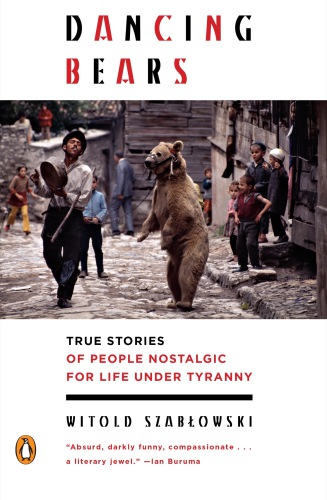
Dancing Bears
True Stories of People Nostalgic for Life Under Tyranny
کتاب های مرتبط
- اطلاعات
- نقد و بررسی
- دیدگاه کاربران
نقد و بررسی

September 11, 2017
Polish journalist Szabłowski (The Assassin from April) gives a sharply drawn account of people in “newly free societies” who long for life to be the same as it was in the unfree past. His title derives from the centuries-old practice in Bulgaria of training bears to dance, a practice that was outlawed when the country joined the E.U. in 2007, forcing the release of the dancing bears into the wild. To this day, the bears miss their masters and dance for them whenever they are reunited. Szabłowski’s book comes in two parts, first telling a heartrending story of the bears and their keepers, then sketching individual profiles, mainly of Eastern Europeans unhappy with freedom and change. The voices include a Ukrainian priest who thinks the European Union is a satanic temptation and last-gasp Stalin worshippers in the Caucasus. Szabłowski ends with an unhappy Greek railing against German-imposed austerity and capitalism. Connected by the allegory of performing bears, Szabłowski’s melancholy personality studies underscore freedom’s challenges and the seductions of authoritarian rule. Agent: Magdalena Debowska, Polish Rights.

December 15, 2017
The unsettling transition from socialism to democracy leaves many people longing for the past.Polish journalist Szablowski (The Assassin from Apricot City, 2013), winner of journalism awards in his native Poland as well as an English PEN award, investigates the effects of newfound freedom on individuals who spent their lives under authoritarian rule. Some of those individuals are bears: captured, tethered, and trained to dance in order to provide a livelihood for their Romani owners. In 2007, when Bulgaria joined the European Union, keeping these bears was outlawed; they were removed from captivity and sent to a wildlife refuge where they could roam free. Freedom, though, proved a challenge: having been plied with alcohol and candy, "they were used to having somebody do the thinking for them," and they became aimless and depressed. The bears' difficult adjustment to freedom serves as an analogy for humans in countries that emerged from communism. Like the bears, many individuals found freedom "extremely complicated." "It turns out," the author discovered, "that fear of a changing world, and longing for someone who will relieve us of some of the responsibility for our own lives" is widespread, even beyond "Regime-Change Land." In a brisk narrative, translated by Lloyd-Jones, Szablowski reports from Cuba, where people fear that Castro's death will change the culture for the worse; and from Albania and Estonia, where people complain about the breakup of the Soviet Union, the infiltration by the European Union and the U.N., and the trials of independence. "What do we need all this capitalism for, all these American cheeses, juices, and chocolate?" one woman complains. When a power station was built in Kosovo, residents opted to buy their own small generators rather than pay electrical bills. At a Stalin museum, docents extol Stalin's memory, defending him from such events as the famine in Ukraine and the Katyn massacre. Communism provided free health care, education, utilities, and security, the author was repeatedly told; capitalism leaves some feeling unprotected and at sea.A surprising look at societies grappling with profound change.
COPYRIGHT(2017) Kirkus Reviews, ALL RIGHTS RESERVED.

























دیدگاه کاربران